What's a Poodle Doing Here?
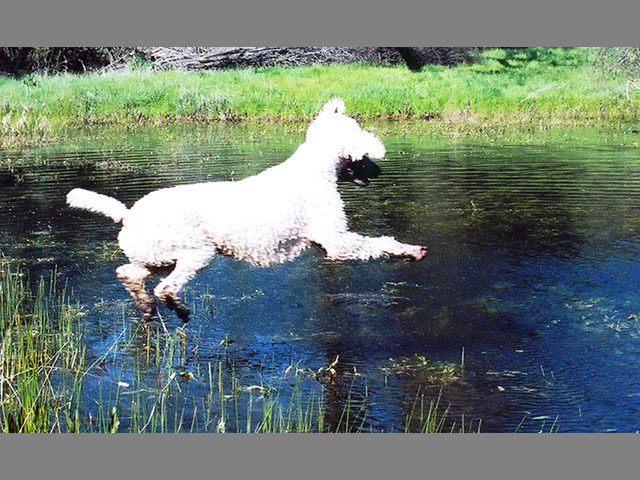
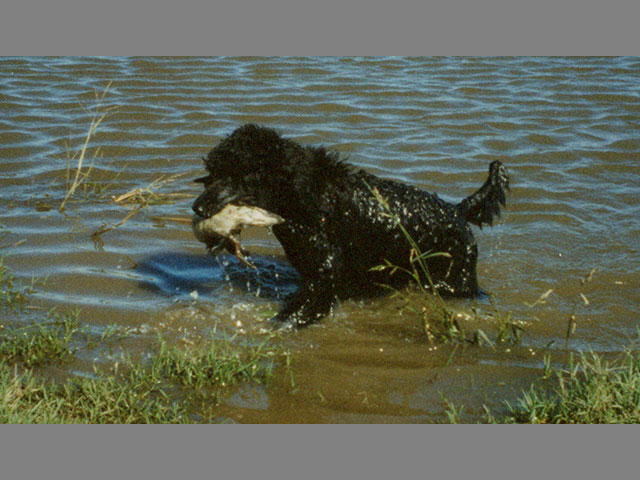

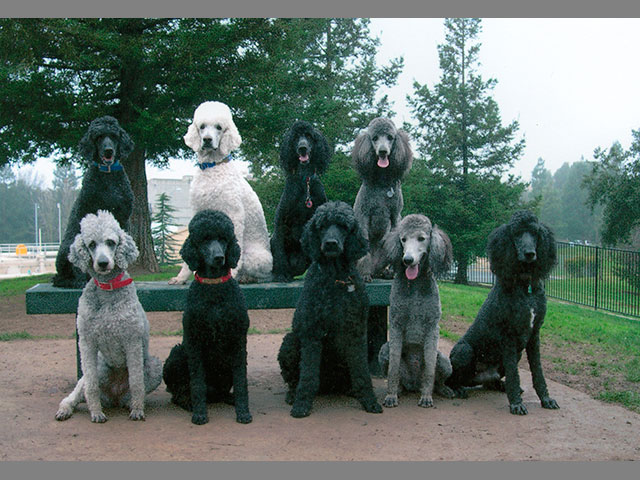
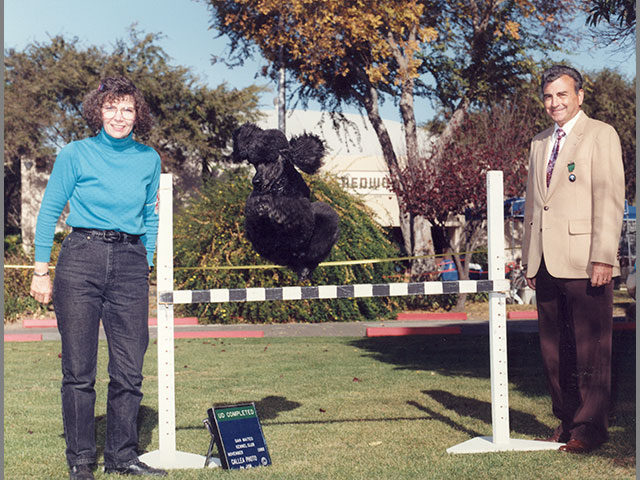
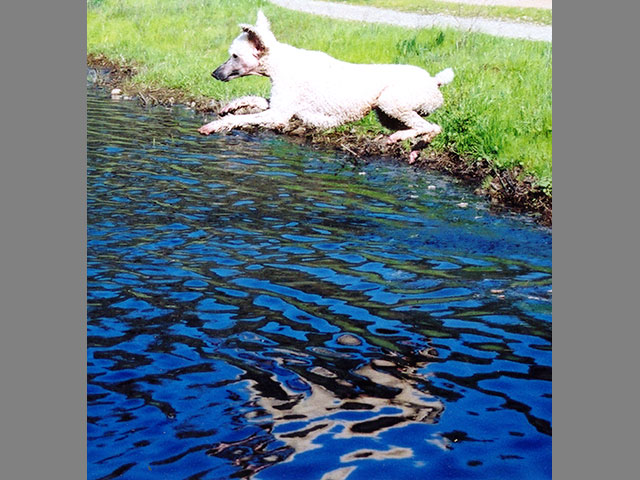
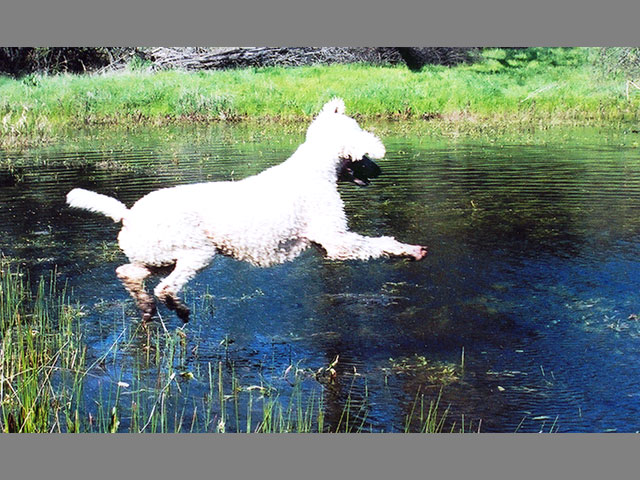
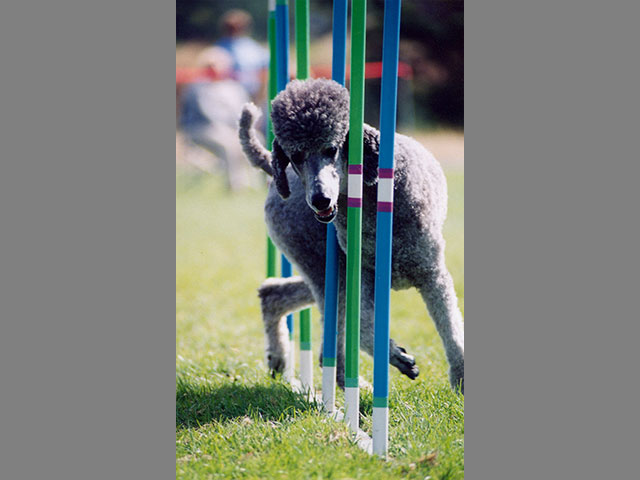
Rough Education
As a girl, Grace Blair lived on a Montana ranch with Border Collies. Then along came an unusual dog. "When I was five, a family friend gave us a white dog. I remember, we had to 'shear' her like a sheep. My parents didn't know what she was, and I had no clue. But I absolutely fell in love with her. She had to be a Standard Poodle."
Later, after graduating from medical school, living in California as a cardiac surgeon, Dr. Blair wanted a canine companion to accompany her on fishing expeditions. Knowing little about dogs, she researched breeds at the library and was excited to read that Standard Poodles were originally bred for water retrieval.
"They sounded exactly like what I wanted, although I didn't like their frou-frou hair cuts." At a local dog show, Dr. Blair observed Standard Poodles, first checking out the conformation ring, then wandering over to the hurdle races. She loved the hurdlers' energy and personality, and they had more dignified hair cuts.
Not long after this, Dr. Blair was the proud owner of Danny, her first Standard Poodle.
Or maybe not so proud. "I picked the most outgoing puppy in the litter. But the breeder wouldn't show me the mother and wouldn't let me see him with the other puppies, which I didn't realize was wrong. He was a college education in canine problems." Eight of his teeth did not grow in, he was hyperactive, and epileptic.
"If he was walking by the chair when he had a seizure, after that he would be afraid of the chair. If it happened near the couch, he would be afraid of the couch. After a while, he was terrified of everything." She fell in love with Danny, but with eight seizures a day, his life an endless series of terrors, Dr. Blair made the painful decision to euthanize him at 11 months of age.
Success in the Ring
While her first Standard was alive, Dr. Blair got a second, Quasar, and took him to obedience classes. Quasar became an AKC champion, which is amazing considering how little Dr. Blair knew then. "I was in class with Quasar. Someone said, 'What a beautiful puppy. You should show him.' I answered, 'Show him to whom?'" She still laughs at this.
While showing Quasar, and doing obedience, Dr. Blair also did tracking with him. By this point, she was interested in breeding, and envisioned an ideal Standard Poodle. Although Quasar was healthy and successful, he was dog aggressive. "I neutered him after he became a champion. I didn't want to perpetuate those problems."
Dr. Blair hit the books again, studying the origins of aggressive behavior and health problems. "I learned about early socialization, what dogs need from their breeders and litter mates." With more knowledge, she chose a puppy that had it all. Jeannie became an AKC champion, had excellent health, a great personality, and was the first dog Dr. Blair bred. Observing the personalities of Jeannie's puppies was an epiphany. "They were so smart, just doing conformation would have been a disservice. They were great at conformation, but their brains weren't stimulated enough."
Illustrating the intelligence of Pogo, one of those puppies, Dr. Blair recalls when a friend boasted that her 18-month-old child knew 20 words. "I was thinking, 'Pogo knows more words than her child!'" Later, Dr. Blair wrote them all down. "In five minutes, I came up with 42 words. By the time Pogo died at 15, he had a massive vocabulary." No wonder he had so much to talk about: while becoming an AKC champion, Pogo earned obedience and tracking titles, hunted pheasants with Dr. Blair, and excelled at agility.
Encouraging Versatility
At agility practice one day, Dr. Blair observed that several of the other dogs had health problems – epilepsy, allergies, or weak hips. "A lot of them were from show kennels but had such poor structure they couldn't do jumps correctly."
She realized that agility was a terrific test of a Standard Poodle's physical soundness. Dr. Blair and 20 other owners formed a non-profit group called Versatility in Poodles (VIP), which poses basic questions, such as "How can we encourage breeders to improve health, structure, and temperament? How can we educate puppy buyers about health tests and evaluating breeders?"
VIP developed a series of physical trials for Standard and Miniature Poodles, with workshops in agility, retrieval, obedience, field work, and tracking, revealing skills and exposing faults. Through VIP, dogs earn points towards versatility certification (VC) and versatility excellent certification (VCX).
Dr. Blair and her VIP associates have entered territory previously thought impossible. "Last year, the Poodle Club of America had a hunt test. Fifteen years ago, if I had said there will be a hunt test for Poodles, people would have laughed me out of the building."
Endless Discovery
Now retired, back on a ranch in Montana, Dr. Blair continues searching for new forms of versatility. When a member of the American Association of Herding Breeds called to speak about the joys of herding sheep, Dr. Blair knew what her dogs would try next.
The way her Poodles took to herding, Dr. Blair wished she had discovered it earlier. "They absolutely turned on. One dog, who had never been interested in obedience or tracking, just came to life when he saw sheep. There he was, herding in his show coat!" VIP was soon offering a herding instinct test.
After selling her puppies, Dr. Blair stays updated on their achievements. A few years ago, she was pleasantly surprised to learn of one who not only earned his agility title, and hunted, but also won an award from the state of Oregon for therapy work. Recognizing another opportunity for her Poodles, Dr. Blair began selecting puppies with therapy skills and placing them with psychologists.
One of her Poodles, Tessie, who recently died at the age of 15, was a champion and master of agility, tracking, hunting, and herding. "She was absolutely unbelievable. To her last day, if I showed her something new she dove in and gave it a try."
Thinking of Tessie, Dr. Blair looks back on four decades of encouraging versatility in Poodles and people, all beginning with that little girl who did not even know what kind of dog she had. "The best thing we can say is that we gave our dogs a good, long life, a chance to learn. The more mental stimulation we give them, the more enriched their lives are, the tighter your relationship becomes. When you have these experiences together, it's as if the dog knows your mind."
